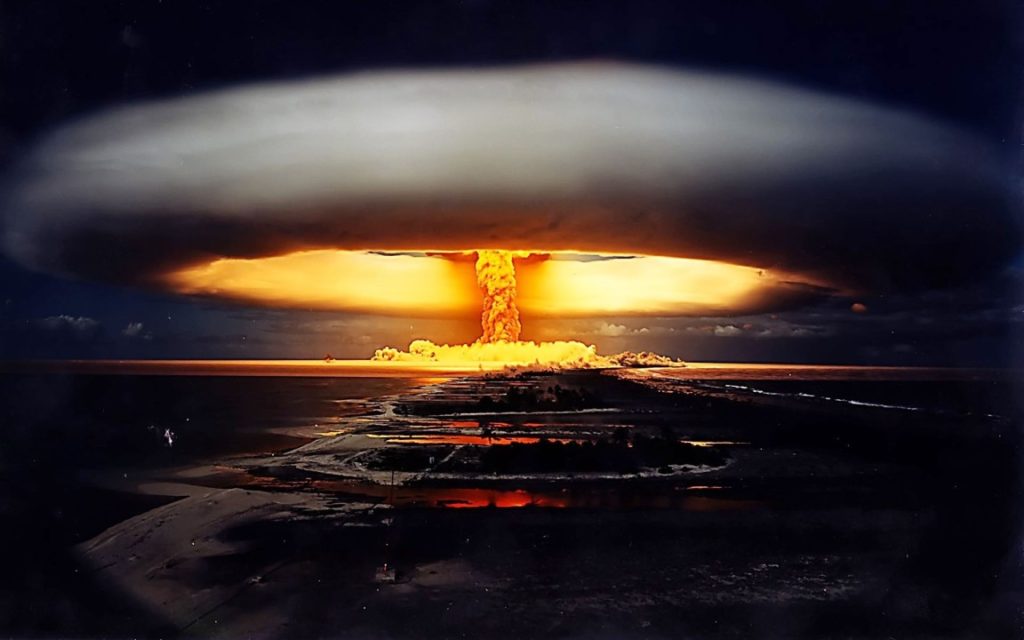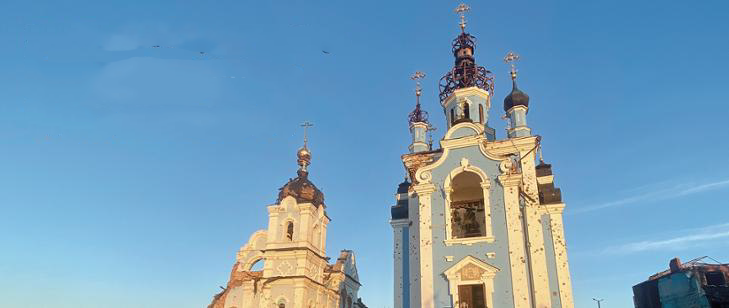By James Hodson (AI for Good Foundation), in collaboration with Tania Babina (Columbia University), Tetyana Balyuk (Emory University), Anastassia Fedyk (UC Berkeley), and Yuriy Gorodnichenko (UC Berkeley).
- Sanctions against Russia are not yet effective in ending Putin’s war in Ukraine.
- There is no difference in Putin’s mind between Ukraine winning against Putin and NATO winning against Putin.
- There will be no continuation of Western-aided resistance once Putin takes key Ukrainian cities and supply networks.
These are three key points that the Western/NATO powers have seemingly miscalculated. The current basic misunderstandings of game theory and Putin’s reasoning could quite easily cost us the stability of the world for the next 30 years.
On the Failure of Sanctions
Russia’s economy runs on oil and gas. More than half of the Russian Federation’s annual budget is dependent on fluctuations in commodity prices. Furthermore, the Russian government relies on the liquidity of payments through commodity trade in order to enable their day-to-day spending needs. That is: free cash flow from oil and gas is the only really important variable in Russia’s short- to medium-term financing of a war.
When large sanctions were announced against Russia over the past week, the price of oil and gas shot up—reflecting heightened supply risk and geopolitical tensions. Whereas certain tax revenues of the government, rent income from corporate holdings, and so on might be hit in 2023, and the ruble will be weaker for the purchase of goods from abroad, the immediate overwhelming effect of the sanctions has been to give Putin a boost in liquidity to spend on the war machine.
The only thing that can have an immediate effect on war financing is to stop all oil and gas purchases from Russia.
Yes, some countries will need emergency assistance to secure minimum necessary supply from elsewhere. Yes, there will be a short-term need to increase reliance on nuclear energy, shale, and strategic oil and gas reserves. Yes, there will be further price-related pain at the pump. However, in order to have any chance to save the planet from disastrous climate change scenarios, the first step of decoupling the world from its reliance on Russian oil and gas has been long overdue. In the medium to long term, this may be one of the best decisions we could make for humanity.
On Basic Game Theory and Putin’s Calculus
NATO countries have been unwilling to publicly consider any direct military intervention in Ukraine, including the implementation of a no-fly zone over Ukrainian territory. The reasoning goes like this: NATO would need to enforce the no-fly zone. Engaging with Putin’s military when they violate the no-fly zone would be akin to a declaration of war.
Putin has recently stated that the West’s sanctions were “akin to a declaration of war.” What NATO and the entire democratic world seems to have been unable to grasp in the last several weeks of build up and action is that Putin is not at all interested in the action or inaction of NATO. Putin is interested in whether or not he can achieve his objective—the total destruction and subjugation of the Ukrainian nation (and the other former USSR and former Warsaw pact nations).
As long as Putin believes he is able to achieve his objective, he will not use any of the escalation cards he has available. However, as soon as Putin identifies that he is on a path to making his objective unachievable, he will take actions up to and including the most destructive action he would personally be willing to take (we don’t exactly know what that would be, but it could be rather devastating).
Please re-read that last sentence. It has nothing to do with NATO engaging or not engaging. It is only dependent on Putin winning or not winning.
Therefore, if the Western world’s stated objective is to prevent Putin from destroying and subjugating Ukraine, then achieving this objective—no matter how it happens—will set Putin on whatever escalatory path he has in mind. This has become even more clear in the last week, as Putin’s inability to take Ukraine within the first few days led to indiscriminate bombing of civilians, cutting off civilian infrastructure, and shelling hospitals, kindergartens, and a nuclear power plant.
Let us be crystal clear here: The only way to prevent Putin from “escalating” is to allow Putin to destroy and subjugate Ukraine (and then other former “possessions” of the USSR or the Russian empire, such as Georgia, Finland, Latvia, Lithuania, Estonia, and Poland). We have already been dragged into a game where the only options are to let Putin have everything he wants going forward or to confront his threats.
Looking back at the early stages of WW II (whose script is eerily similar to today’s events in almost every respect—I urge you to spend some time on the NYT Archive of stories from September 1939), almost everyone would agree that if the Allies had acted sooner, WW II may have been much shorter and less bloody. Churchill is rolling in his grave watching current events unfold. He would have acted by now.
On the End Game for Ukraine
Western powers have talked about continuing to send aid to the resistance in Ukraine even should Putin’s military be successful in toppling key government centers in Kyiv and major cities across Ukraine. This is highly unlikely to be possible.
If Putin takes over Ukraine, he will undoubtedly institute martial law throughout the country and close borders and/or position a heavy military presence all along the border with NATO countries. A puppet government in Kyiv will quickly sign a range of mutual security arrangements with Russia, possibly asking to formally join the Russian Federation or otherwise becoming a de facto military launchpad for Russia—akin to Belarus. Putin will go on to threaten that the “provision of aid to terrorists within the borders of the Russian Federation is an open declaration of war upon the Russian Federation.”
This will be a perfect pretext for his next incursions into the land of NATO allies, which many high-ranking officials over the last decade have hinted may still not be enough to get NATO to engage Putin directly.
At that point, Putin’s threats of nuclear war will be just as heavy as they are today, except that (a) Russia will be in a stronger position with control of Ukraine’s territory, (b) Putin will be more confident and brazen in his actions after seeing that NATO is too afraid to oppose him even as he annihilates sovereign states, and (c) there will be enormous problems for Europe’s food supply chain when Ukraine’s 80 million tons of grains are removed from commodity markets.
Yes, that’s correct: Ukraine is commonly known as the “breadbasket of Europe,” just as Russia might be termed its “oil well.”
If we let Ukraine fall, providing ongoing military aid to Ukraine will be highly problematic, because doing so would entail all of the same “risks” as we are too weak to confront today. We will be left in an impossible situation in which an emboldened Putin is free to take whatever actions he chooses with no repercussions.
Where does that leave us? We cannot let Ukraine fall. Ukrainians are fighting bravely in the face of increasing cruelty from an aggressor. But a country with 45 million people that voluntarily gave up its nuclear weapons in return for guarantees on its sovereign integrity cannot win alone against an invading dictator so terrifying that even the strongest military alliance in modern history (NATO) cowers before him. Supporting Ukraine means giving real, substantial, and urgent military assistance. It means confronting Putin directly. Anything less would amount to sanctioning a slow death for Ukraine while naively hoping that the rest of the world gets to move on.
In 1939, there was no NATO. Britain was under no obligation to provide assurances to Poland that they would step in should Germany invade. The strategy of avoiding directly engaging Hitler on the off-chance that he would be satisfied did not work. It can never work. As Tim Bouverie points out in Appeasement: Chamberlain, Hitler, Churchill, and the Road to War:
“The lead-up to World War II, was about what bad people are able to do when they think that the good people aren’t prepared to fight.”
As Rob Citino, Senior Historian at The National WWII Museum, pointed out to Time magazine in 2019:
“It seems Hitler can no longer be appeased [in 1939], but attempting to appease him was wrong all along. He would just continue to make demands and threaten his neighbors ad infinitum.”
In Conclusion
I am half British, half Italian, and a US “anchor baby”. I grew up at a time when WWII was still a major topic of conversation. All of my grandparents talked about it on a regular basis. Zio Mario was detained in Auschwitz, Nonno Giovanni was an undercover CIA agent in Italy during and after WWII, and our family were a major part of the Partisan movement in Northern Italy—they would often get jailed ahead of Mussolini’s rallies. Many of my British family members were actively deployed in the Navy and Air Force.
I am in some sense genetically scarred by WWII, and a growing feeling of anxiety and unease at Putin’s actions screams déjà-vu. I ask that people really think through the implications of allowing Ukraine to be lost in this way, as a first major step towards the scarring of another generation by war and suffering.
We are already late, but we don’t have to be too late to stop deceiving ourselves. We still have very limited time to do the right thing for the free world to prevail. Standing with Ukraine and standing for freedom and democracy actually requires standing. So, let’s get up.
If you live in a war affected area please visit our Svidok(witness) – war journal







